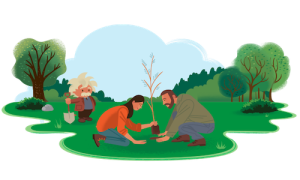At Salesforce, sustainability is now one of our core values, and as important as it is for companies to be committed to sustainability, there are a number of things individuals can do too. I caught up with some employees who are involved in EarthForce – one of our employee resource groups dedicated to sustainability and the environment – for some top tips on how anyone interested in becoming more sustainable could get started.
Fiona Frechat, Sales Program Senior

There are a number of things individuals can do to be more sustainable and environmentally conscious. The top tip I can give (since it was the first step I took) is to make changes in your diet and your consumption habits.
A vegan, vegetarian or even a flexitarian (semi-vegetarian) diet reduces our carbon footprint considerably. I also believe in the butterfly effect – if everyone makes small changes, it will lead to big changes and actual progress.
Also, you will be able to motivate and influence other people along the way to follow you, and in the end, more and more people will adopt better practices which will lead to real difference. We have a great power to create and establish change in our own ecosystems.
Catalina Hernandez, Customer Experience Agent
I think when it comes to starting a sustainability journey, it’s important to start slow and steady. Sustainability is not a trend; it’s a commitment to our planet, valuing and respecting our animals and resources. When that thought sank into my head, it became easier for me to dive in. I started by looking at simple swaps on my day-to-day items (personal and cleaning products), then I changed my diet, I gave up fast fashion, I looked for support groups and now I’m trying to influence (but not impose my views upon) my friends and family.

I do think it’s important to be kind to yourself though. Being fully transparent, every now and then I do feel powerless and anxious. I ask myself “Do my actions matter? Can I really make a difference?“ Let’s be honest; personal actions alone are not enough, but you can encourage others around you and plant the seed for new generations to advocate for and develop cleaner technologies and produce a systematic change.
Yasmin Martin, Technical Consultant

I try to be more sustainable when going out to the regular food shop, and I think this is a great start for anyone. Remember to bring your own shopping bag with you, and try to invest in a good reusable bag – mine are still going strong 4+ years later! The cooler bags are great for those hot summer days to keep frozen/chilled products from spoiling before you get home.
Buying fruit or veg which are loose and not in plastic packaging is great too, as this already stops you from bringing extra plastic home. If travelling, I wrap them in some tissue or take a lunchbox-style container to keep them safe.
Is your cupboard full of plastic packing? Take the items out of the plastic and place them into baskets which will help you see how much product you have left (and stop extra buying and wastage) but also will make the inside of your cupboards pretty.
Cathleen Cordoba, Workplace Services Associate
My top tip, which I like to do on myself, is a personal ‘environmental audit’. This is a good practice once or twice a year. Look at your current living habits and see what can be changed, very simple but effective. By making these simple changes you will see a great impact on your wellbeing, your pocket, and towards living greener.
Take stock of your wardrobe and household items. What do you have versus what do you need? If there is too much of something, then give it away and only purchase as required.

This helps declutter and live more practically, and cherish what you need more. If you have the opportunity to grow it yourself (GIY), then go for it! There is great gratification in providing for yourself, no more throwing away overbought or unused food items. When you GIY, you only pick what you need at that time and therefore reduce food packaging. Turn off lights and switches when not in use. Choose an energy provider that offers clean energy from renewable sources. Get an eco/night time-saving plan to use washing machines at night time. Use steaming rather than boiling when cooking. There are so many small changes we can make that can have a real impact, it’s just about committing to making these changes.
Investing in the Planet
While companies have a huge responsibility to invest in the planet, it is also down to individuals to do their part as well. But aside from the small changes we can make in our own lives, it’s vital we use our voices to inspire others and businesses to step up to these challenges to ensure we can reduce our global carbon emissions.
To learn more about Salesforce’s commitment to sustainability, check out these resources:
- Visit Salesforce Sustainability to learn more.
- Salesforce #TeamEarth campaign.
Learn how Salesforce is implementing its Climate Action Plan:





















